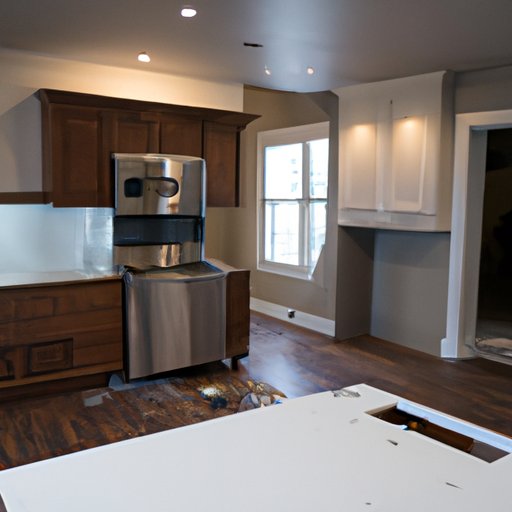Introduction
A kitchen remodel is a great way to update the look of your home and increase its value. But it can be expensive, depending on the size of the project and the quality of materials used. In this article, we’ll explore the average cost to renovate a kitchen, the pros and cons of doing so, what factors impact the cost, and tips for completing the project on a budget.
A Breakdown of the Average Cost to Renovate a Kitchen
According to HomeAdvisor, the average cost to remodel a kitchen ranges from $12,500 to $34,100. This estimate includes costs for labor and materials, as well as additional expenses such as permits and contractor fees.
Labor costs are typically the most expensive part of a kitchen remodel. Depending on the type of work being done and the size of the project, labor can range from $3,000 to $17,000 or more. The cost of materials also varies greatly based on the type of cabinets, countertops, appliances, and fixtures you choose. High-end materials such as marble countertops, stainless steel appliances, and custom cabinetry can quickly add up.
In addition to labor and materials costs, there are other expenses that may need to be factored in. These include permit fees, contractor fees, and any subcontractor costs for electrical or plumbing work. If you’re hiring a professional designer to help with the project, that will also add to the total cost.

The Pros and Cons of Redoing Your Kitchen
Deciding whether to remodel your kitchen is a big decision and one that should not be taken lightly. There are both pros and cons to consider before taking on such a project.
One of the biggest advantages of remodeling your kitchen is that it can add value to your home. According to the National Association of Realtors, remodeling a kitchen can recoup an average of 81% of its cost when it comes time to sell. Additionally, a kitchen remodel can make your space more functional and enjoyable to use.
On the other hand, there are some drawbacks to consider. Remodeling your kitchen can be a huge undertaking and is likely to disrupt your daily routine. It can also be an expensive project, especially if you opt for high-end materials and professional labor. And depending on the scope of the project, it may take several weeks or even months to complete.
What Factors Impact the Cost of a Kitchen Remodel?
There are several factors that can affect the overall cost of a kitchen remodel. The size of your kitchen is one of the most important considerations. Larger kitchens require more material and labor, which will drive up the cost. Additionally, the quality of materials you choose will have a significant impact on the total cost. Higher-end materials such as marble countertops and custom cabinetry will be more expensive than basic laminate countertops and stock cabinets.
Location is another factor to consider when estimating the cost of a kitchen remodel. In areas with a higher cost of living, labor and materials may be more expensive. Additionally, the availability of qualified contractors and subcontractors in your area can affect the cost of the project.

How to Save Money on Your Kitchen Remodel
If you’re looking to save money on your kitchen remodel, there are a few strategies you can employ. Shopping around for supplies is one of the easiest ways to cut costs. Compare prices online and in stores to get the best deal on materials. Doing some of the work yourself can also help reduce labor costs. You can save even more by reusing existing appliances and fixtures instead of buying new ones.

Five Tips for Redoing Your Kitchen on a Budget
If you’re remodeling your kitchen on a budget, here are five tips to keep in mind:
- Plan Ahead: Take the time to plan out the project and create a realistic budget. This will help you stay on track and avoid unexpected expenses.
- Stick to Your Budget: Once you’ve created a budget, do your best to stick to it. Impulse purchases can quickly add up and blow your budget.
- Choose Low-Cost Alternatives: Consider low-cost alternatives to expensive materials. For example, laminate countertops can be just as functional as granite without the hefty price tag.
- Consider DIY Projects: If you’re handy, consider tackling some of the work yourself. Painting, tiling, and minor carpentry work can be completed with minimal tools and experience.
- Don’t Skimp on Quality: While it’s important to stay within your budget, don’t skimp on quality. Investing in high-quality materials and fixtures now can save you money in the long run.
Conclusion
A kitchen remodel can be a rewarding and worthwhile investment, but it’s important to understand the true cost of the project. Labor and materials, as well as additional costs like permits and contractor fees, can add up quickly. Knowing the factors that impact the cost and having a budget in place can help ensure your kitchen remodel stays on track and within your budget.
(Note: Is this article not meeting your expectations? Do you have knowledge or insights to share? Unlock new opportunities and expand your reach by joining our authors team. Click Registration to join us and share your expertise with our readers.)
